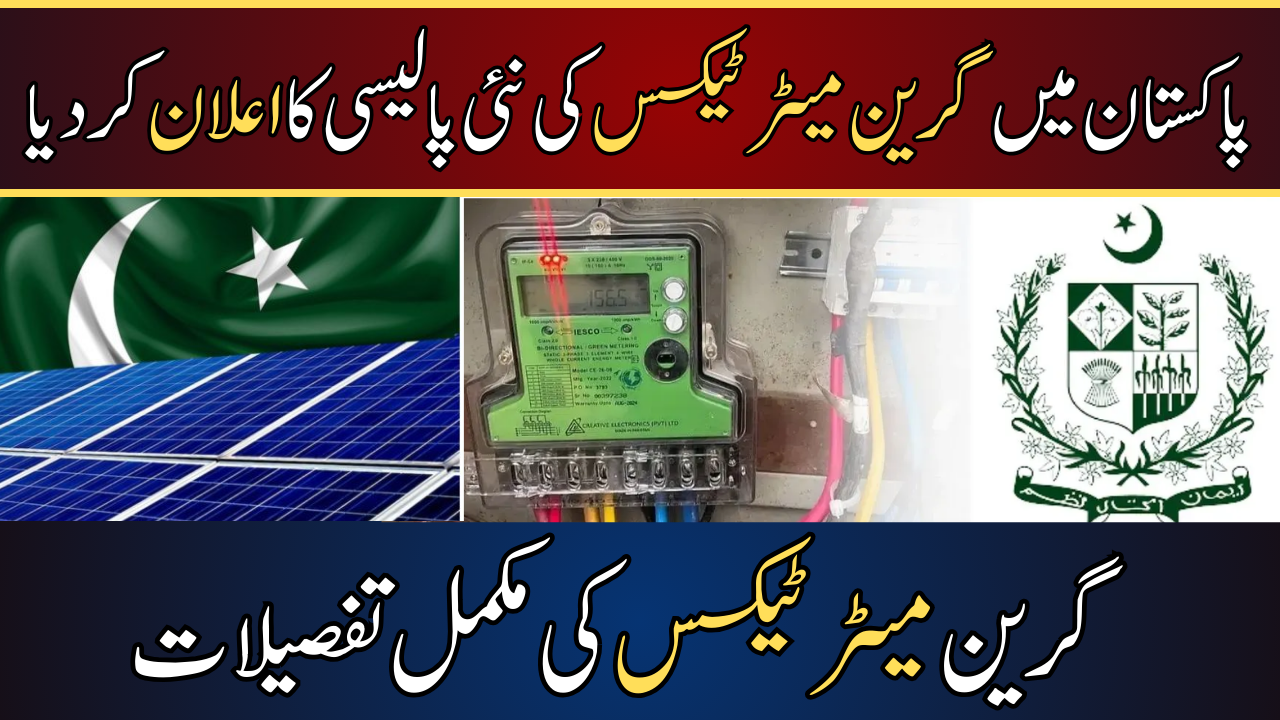Pakistan New Green Meter Tax Policy
Pakistan is set to implement a new Green Meter Tax Policy as part of its efforts to promote renewable energy and address the nation’s energy crisis. This policy aims to encourage the adoption of solar energy systems while addressing concerns related to electricity tariffs and grid stability.
Read More Information: 5KV Solar Scheme Started by Maryam Nawaz
What is a Green Meter?
A Green Meter, often referred to in the context of net metering, is a device used to measure the amount of electricity generated by renewable energy sources, such as solar panels, that is fed back into the grid. It helps in tracking both the electricity consumed from the grid and the excess energy generated and exported by the consumer. This system allows households and businesses to receive credits for the excess electricity they produce, which can be used to offset their future electricity bills.Read More Information:
.Read More Information: Punjab Agriculture Department Jobs
Overview of the Policy
The Green Meter Tax Policy focuses on solar energy systems and the net metering process. Net metering allows households with solar panels to sell excess electricity back to the grid, offsetting their energy costs. The new policy proposes changes to the financial incentives and regulatory framework governing this process.
Read More Information: NADRA CNIC Online Renewal Verification
Key Components of the Green Meter Tax
Revised Net Metering Rates
The policy proposes adjusting the payments for excess electricity injected into the grid by solar households. This aims to make solar investments more attractive by providing better returns on the electricity generated.
Read More Information: Get Benazir Kafalat Payment via 22 Campsites
Tax Implications
Distribution companies (Discos) have been instructed to consult with the Federal Board of Revenue (FBR) regarding tax applicability for net metering consumers. This step is crucial to ensure clarity on tax obligations and prevent any financial burden on solar energy adopters
Read More Information: Budget of BISP to 593 Billion
Grid Stability and Infrastructure
To maintain grid stability, the policy includes measures to improve the infrastructure and reduce transmission and distribution (T&D) losses. This is essential to handle the increased integration of solar energy into the national grid..
Read More Information: Zeenat Welfare Laptop Scheme
Encouraging Domestic Solar Generation
The policy aims to support domestic solar generation by offering incentives and reducing bureaucratic hurdles. This will help Pakistan transition towards renewable energy while reducing reliance on expensive thermal power plants.
Benefits of the Green Meter Tax Policy
Cost Savings
Households can significantly reduce their electricity bills through net metering, making solar energy a cost-effective solution.
Read More Information: Punjab Free Solar Scheme Registration Started
Environmental Impact
Increased adoption of solar energy will reduce the carbon footprint and help Pakistan meet its climate goals.
Energy Security
By diversifying the energy mix and reducing dependency on fossil fuels, Pakistan can enhance its energy security.
Challenges and Concerns
Implementation
Effective implementation of the policy requires coordination between various stakeholders, including Discos, the FBR, and regulatory authorities.
Public Awareness
Raising awareness about the benefits and procedures of the Green Meter Tax Policy is crucial for its success.
Infrastructure Upgrades
Upgrading the aging power infrastructure and ensuring the availability of net metering equipment are vital for the smooth integration of solar energy into the grid.
Read More Information: Taleemi Wazaif Registration
FAQs
1. What is the Green Meter Tax Policy?
The Green Meter Tax Policy is a new initiative by the Pakistani government to promote solar energy adoption by revising net metering rates and addressing tax implications for solar households.
2. How does net metering work?
Net metering allows households with solar panels to sell excess electricity back to the grid, offsetting their energy costs and receiving payments for the surplus power they generate.
3. Will the new policy increase my electricity bills?
The policy aims to make solar investments more attractive and cost-effective, potentially reducing overall electricity bills for solar households.
4. What are the tax implications of the new policy?
Distribution companies are working with the FBR to clarify tax obligations for net metering consumers, ensuring transparency and preventing financial burdens.
5. How will the policy benefit the environment?
By promoting solar energy, the policy will reduce the carbon footprint and help Pakistan achieve its climate goals.
6. What is a Green Meter?
A Green Meter is a device used to measure the electricity generated by renewable energy sources and fed back into the grid, helping consumers receive credits for their excess energy production.
7. What are the revised net metering rates under the new policy?
The revised rates are designed to provide better returns on the electricity generated by solar households, making solar investments more attractive.
8. How will the policy ensure grid stability?
The policy includes measures to improve infrastructure and reduce T&D losses to handle increased solar energy integration into the grid.
9. What incentives are provided for domestic solar generation?
The policy offers incentives and reduces bureaucratic hurdles to support domestic solar generation and reduce reliance on thermal power plants.
10. How will public awareness be raised about the new policy?
The government plans to launch awareness campaigns to educate the public on the benefits and procedures of the Green Meter Tax Policy.


